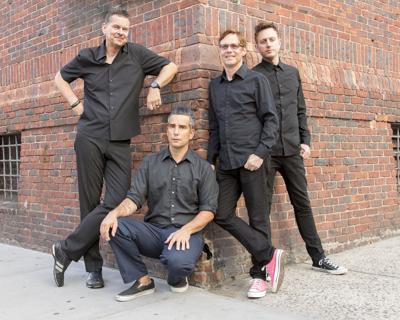Last year, as Pansy Division played shows around the country marking 30 years of its first full-length album, “Undressed,” the pioneering gay rock band noticed more young people in the crowd than they had expected.
People of different ages have always come to their shows, says singer and guitarist Jon Ginoli, but three decades in, he was expecting the crowds to trend a little older.
“During the pandemic, we seemed to have gained a new set of young followers,” he says. “Seeing people in their late teens and 20s coming to see us after really not having had that for maybe a decade — there seems to be a lot of people who have discovered us.”
Ginoli doesn’t attribute that to any one reason. It may be because Pansy Division doesn’t tour as often as it once did, and people take advantage of when they’re in their town. Or maybe one of their songs took off on social media or appeared in a film, like Taylor Mac’s new concert doc “24-Decade History of Popular Music,” which uses Pansy Division’s song “Denny.”
But a major reason is the band’s frank, sex-positive music and legacy as a pioneering group of openly gay musicians is as relevant as ever in a time when hard-won rights are being attacked.
“I felt like our band was evidence of progress and gay rights,” Ginoli says, “and that is true, but then the amount of right-wing attacks on queer people has made it so suddenly some of the things we were singing about, that we can kind of take for granted, are suddenly relevant again.”
Pansy Division is this year celebrating the 30th anniversary of its breakthrough second album, “Deflowered,” and play New Orleans at 10 p.m. Saturday, April 6, at Santos Bar. New Orleans queer punk bands Dog Park Dissidents — the band’s vocalist Zac Xeper credits Pansy Division as a crucial influence — and Atomic Broad also perform.
It’ll be the first time in nearly 20 years Pansy Division has played New Orleans, Ginoli says. The band was scheduled to play a block party during Southern Decadence in 2022, but the event was abruptly shut down due to problems over the permit.
Ginoli and bassist-vocalist Chris Freeman co-founded Pansy Division in San Francisco in 1991, and it is considered one of the earliest queercore bands. Today, the band also includes drummer Luis Illades and guitarist Joel Reader.
Keep up with the latest events at calendar.gambitweekly.com.
By 1993, Pansy Division was signed to Lookout! Records, released “Undressed,” and was becoming popular for its fun sound — a mix of indie and alt-rock and pop-punk — and open, joyful approach to gay culture and sex. The band wanted to fight back against attacks made by anti-gay politicians and people using the HIV and AIDS epidemic as a cudgel.
“We felt we’re going to be a pro-sex, pro-gay band and we’re going to go out and instead of talking about how bad things are, we’re going to celebrate what we like and what’s good and hopefully make people feel better,” Ginoli says.
The members of Pansy Division were in their early 30s at the time, but as they began working on their next album, “Deflowered,” they realized they had a lot of fans in their teens and early 20s. So “some of the second album was written with the idea that we need to speak to people that are younger and not people who have had the experiences we’ve had,” Ginoli says.
The album’s liner notes included condom instructions and a contact list of LGBTQ youth organizations around the country. And the songs on “Deflowered” are “dirty and sweet,” as the band has described it, with tracks like “Groovy Underwear,” the reminder to “Reciprocate,” the S&M fantasy “James Bondage,” and a celebration of girth in “Beercan Boy.” The songs are frank, and pleasure is purposefully mutual.
There also are some more serious tracks, like “Denny,” about a man living with HIV, and “Deep Water,” which uplifts younger gay people and encourages them to hang on. A cover of Pete Shelley’s “Homosapien” closes the album, and Pansy Division reworks a Jonathan Richman piece for “A Song of Remembrance for Old Boyfriends.”
With “Deflowered” in hand, Pansy Division went on tour with former Lookout! labelmates Green Day right as they were breaking out following the release of “Dookie.” The tour exposed Pansy Division to a wider, relatively more mainstream audience, including shock jock Howard Stern, who Ginoli initially mistook for Joey Ramone standing backstage in New York City.
When Pansy Division started 30 years ago, the band was aiming for a gay male audience, Ginoli says. They knew they’d have all kinds of people listening, but that was a community they felt was missing from rock music. Today, many more openly LGBTQ artists are recording and performing, and Ginoli has noticed gender identity is a more prominent topic.
“Punk is the thing that will never die,” he says. “It mutates, not so much musically, but in terms of who is able to take on the mantle of punk rock and say, ‘Hey, this applies to me.’ It’s much broader than it used to be … I see more and more queer bands, and it seems very logical to me.”
Pansy Division plays at 10 p.m. Saturday, April 6, at Santos Bar with Dog Park Dissidents and Atomic Broad. Tickets are $15 via ticketweb.com.
There also are workshops, late-night puppet slams and both day and nighttime giant puppet parades.
The 2024 edition pays homage to New Orleans’ vampire lore.







